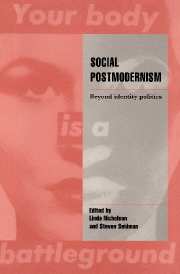Book contents
- Frontmatter
- Contents
- Notes on contributors
- Acknowledgements
- Introduction
- Part I Critiques of identity
- 1 Interpreting gender
- 2 Feminist encounters: locating the politics of experience
- 3 Postcolonial criticism and Indian historiography
- Part II Critiques of the deconstruction of identity
- Part III Postmodern approaches to the social
- Part IV Postmodern approaches to the political
2 - Feminist encounters: locating the politics of experience
Published online by Cambridge University Press: 29 October 2009
- Frontmatter
- Contents
- Notes on contributors
- Acknowledgements
- Introduction
- Part I Critiques of identity
- 1 Interpreting gender
- 2 Feminist encounters: locating the politics of experience
- 3 Postcolonial criticism and Indian historiography
- Part II Critiques of the deconstruction of identity
- Part III Postmodern approaches to the social
- Part IV Postmodern approaches to the political
Summary
Feminist and antiracist struggles in the 1990s face some of the same urgent questions encountered in the 1970s. After two decades of engagement in feminist political activism and scholarship in a variety of sociopolitical and geographical locations, questions of difference (sex, race, class, nation), experience, and history remain at the center of feminist analysis. Only, at least in the US academy, feminists no longer have to contend as they did in the 1970s with phallocentric denials of the legitimacy of gender as a category of analysis. Instead, the crucial questions in the 1990s concern the construction, examination, and, most significantly, the institutionalization of difference within feminist discourses. It is this institutionalization of difference that concerns me here. Specifically, I ask the following question: how does the politics of location in the contemporary United States determine and produce experience and difference as analytical and political categories in feminist “cross-cultural” work? By the term “politics of location” I refer to the historical, geographical, cultural, psychic, and imaginative boundaries which provide the ground for political definition and self-definition for contemporary US feminists.
Since the 1970s, there have been key paradigm shifts in Western feminist theory. These shifts can be traced to political, historical, methodological, and philosophical developments in our understanding of questions of power, struggle, and social transformation. Feminists have drawn on decolonization movements around the world, on movements for racial equality, on peasant struggles, and on gay and lesbian movements, as well as on the methodologies of Marxism, psychoanalysis, deconstruction, and poststructuralism to situate our thinking in the 1990s.
- Type
- Chapter
- Information
- Social PostmodernismBeyond Identity Politics, pp. 68 - 86Publisher: Cambridge University PressPrint publication year: 1995
- 91
- Cited by

